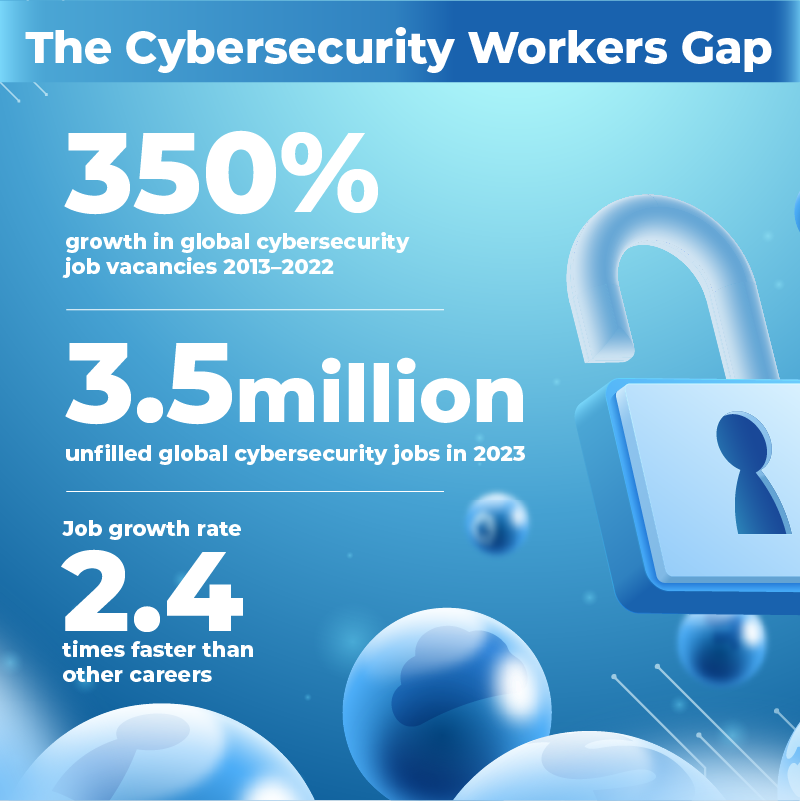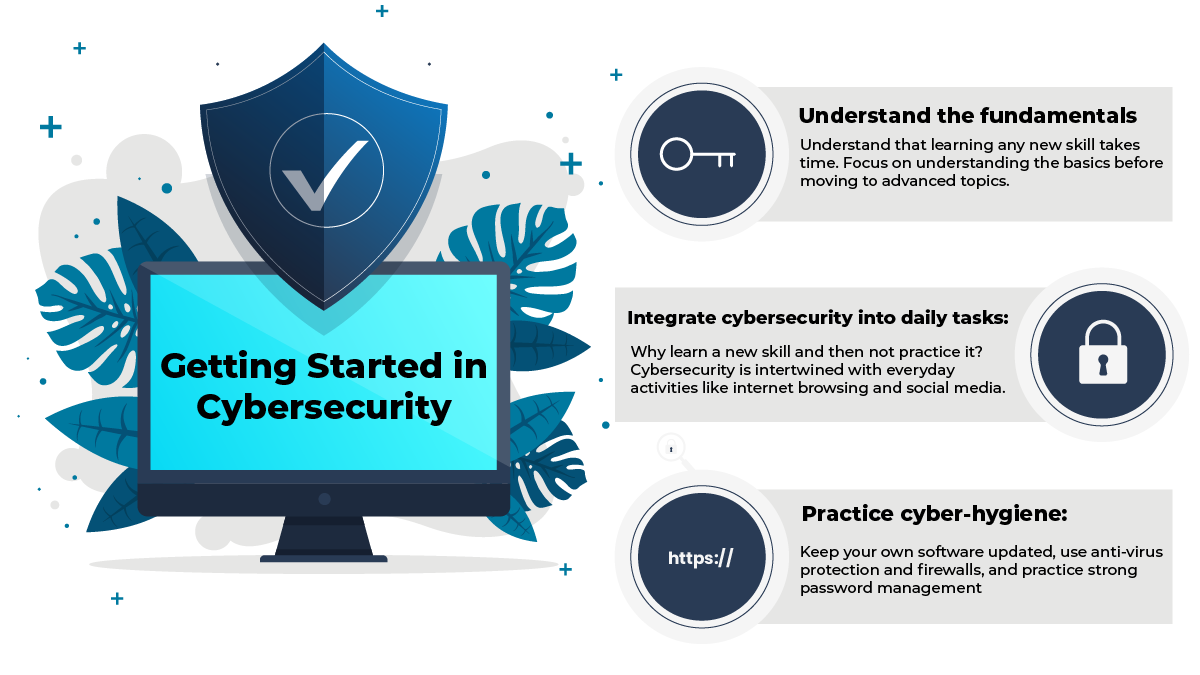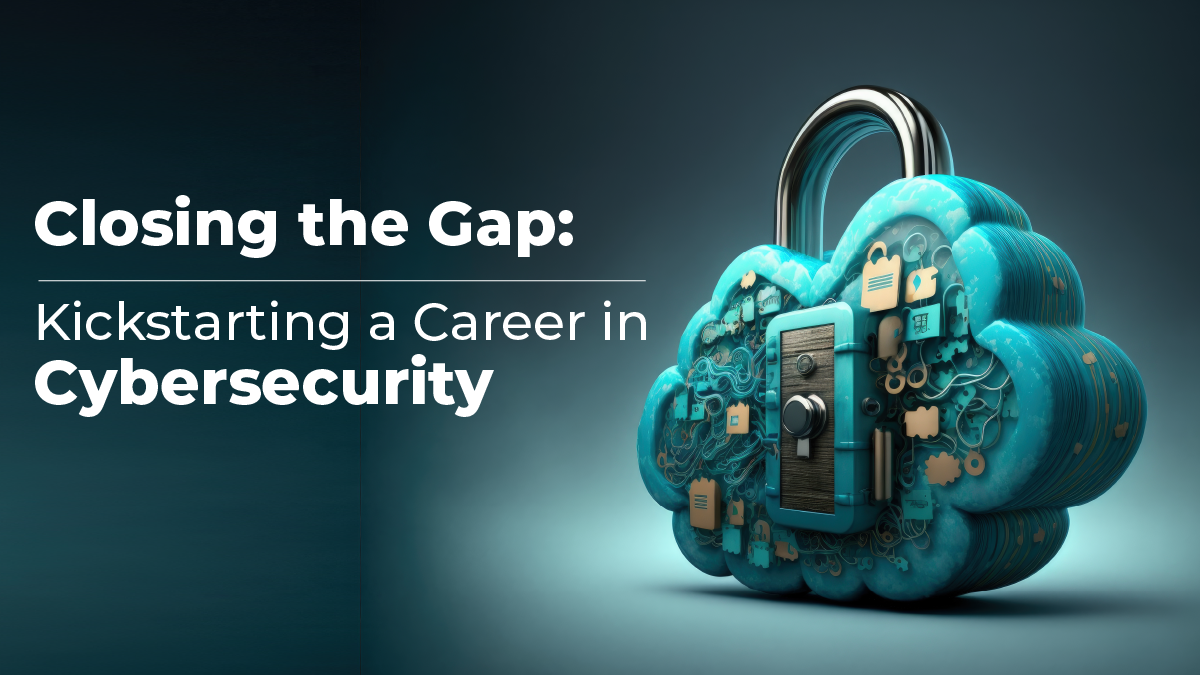Cybercrime is dramatically on the rise. With more than 89% of US organizations experiencing cyberattacks every 12 months and more than 360 million people impacted by data breaches from January–August 2023 alone, it’s a problem that increasingly impacts everyone.
With more people than ever before working remotely, and striking new innovations in AI, it’s also clear this surge will continue in the short term, and with it, the rising demand for skilled cybersecurity professionals. There’s an increasingly pressing need for workers willing and able to take on this fight, at nearly every level.

Despite recent layoffs by major companies like Amazon, Meta, X/Twitter, Microsoft, and Google, cybersecurity in 2024 continues to be a safe bet for job-seekers, with only 72 available workers for every 100 jobs, according to the US Department of Commerce’s National Institute of Standards and Technology.
Organizations aggressively need candidates who can bring new perspectives and ideas, with a learned understanding of this evolving landscape.
In short, there’s maybe never been a better time to consider a career in cybersecurity.
Getting Started
Generally speaking, cybersecurity workers must be knowledgeable about current technologies and able to rapidly adapt, have a passion for technology, and a commitment to cybersecurity.
Several reasonably common-sense steps make this move easier:
- Start with education: as with any career, building a solid educational foundation is an enormous benefit. Cybersecurity professionals often start with computer science and information technology, and pursuing a degree in these areas provides a strong base of technical knowledge.
- Keep up with the continuous developments: stay informed about the latest developments by reading industry blogs, attending conferences, and participating in online forums. Few fields change as rapidly as cybersecurity.
- Specialize: the field is vast and encompasses various domains, including network security, ethical hacking, incident response, AI, and more. Focusing on a particular area of cybersecurity can help you stand out in the job market.
- Get practical experience: this is a hands-on field, and employers value practical experience. Look for opportunities to gain experience through internships, part-time jobs, and personal projects. Building a home lab to experiment with different tools and techniques is an excellent way to develop practical skills that can set you apart from other candidates.
- Network and connect with professionals: a crucial aspect of any career, it helps to attend industry events, join online communities, and connect with professionals in the field. Start with who you already know—networking not only provides valuable insights into the industry but also opens doors to potential mentorship and job opportunities. PTP can help with this, too!Contact us today if you’re considering this move, or on the lookout for employees for your organization.
- Don’t neglect other skills: employers value skills like communication, problem-solving, and critical thinking. Cybersecurity professionals, in particular, often need to explain complex concepts to non-technical stakeholders, and these skills also help to adapt and change in a constantly evolving field.
- Maintain your online presence: showcase your skills and knowledge through platforms like LinkedIn and GitHub. Share insights, contribute to open-source projects, and engage the community. This makes you and what you do more visible to recruiters and potential employers.
- Nurture ethics: cybersecurity can appeal to the hacker in us, as it involves breaking into systems, but it’s essential to do so ethically and legally. The more you can maintain a code of conduct and ensure that your activities align with this, as well as legal and ethical standards, the stronger you’ll be as a professional.
Kirk Hasty, a Senior Technical Product Manager at Carbon Black, recommends the following for workers interested in getting a jumpstart in the field:

Skills to Prioritize
AI in cybersecurity is expected to be a $46.3 billion market by 2027, with the technology acting as a core piece in both the criminal, and security, arsenal. Anyone interested in the field must keep on top of rapid developments, learning how AI and Machine Learning are being put into use. Keeping an eye on new PTP articleson AI and ML can help you do it!
Professionals should also understand how AI-generated content can be used in cybersecurity.
Ransomware is offered as a service (RaaS), and there are established tools for its application, prevention, and response. Develop experience and understanding with various antivirus systems and firewall technologies. Understand how operating systems lock down network shares.
With quantum computing, another emerging technology, it’s as important as ever to understand how encryption works, and why many existing methods that seemed impenetrable may soon be in danger of being compromised.
As Kirk Hasty recommends: “Focus on technologies that ensure data privacy and secure network communications.”
He also recommends learning parallel fields, like system administration, programming, or network engineering:
“Gaining [this] experience can provide valuable skills that will make you a better cybersecurity person in the future and help you understand concepts more easily.”
Useful Certifications
With the ever-changing landscape of cybersecurity, certifications give confirmation of knowledge or mastery that can prove your capabilities to others and help get you started.
“Explore cybersecurity certifications,” says Hasty, “like CompTIA’s Security+, to gain a structured understanding of the field and then if it interests you can seek more specialized training based on what an employer may require or your interests in the field.”
While there are numerous options out there, Hasty recommends considering the following for getting started:
- CompTIA Security+: A foundational certification that covers a wide range of cybersecurity topics
- GIAC Security Certifications: Focuses on specialized areas of cybersecurity and is highly regarded by employers
- CISSP: (Certified Information Systems Security Professional) is a globally recognized certification in information security, designed for security practitioners, managers, and executives interested in proving their knowledge across various security practices and principles.
Conclusion
In 2024, cybercrime is expected to cost the world more than $14 trillion, and with a dynamically evolving technological landscape and shifting workforce, that number is only expected to rise.
Cybersecurity professionals are already in high demand, and this surge creates a great opportunity for those with a passion for technology and an interest in keeping organizations and individuals safe.
Building a solid groundwork with education, practical experience, certifications, and networking, aspiring cybersecurity experts can make a rapid impact in an area of dire need.
And with an estimated 1 in 2 organizations suffering a successful cyberattack in just the last 3 years alone, the need for help has maybe never been greater.





 Work with us
Work with us